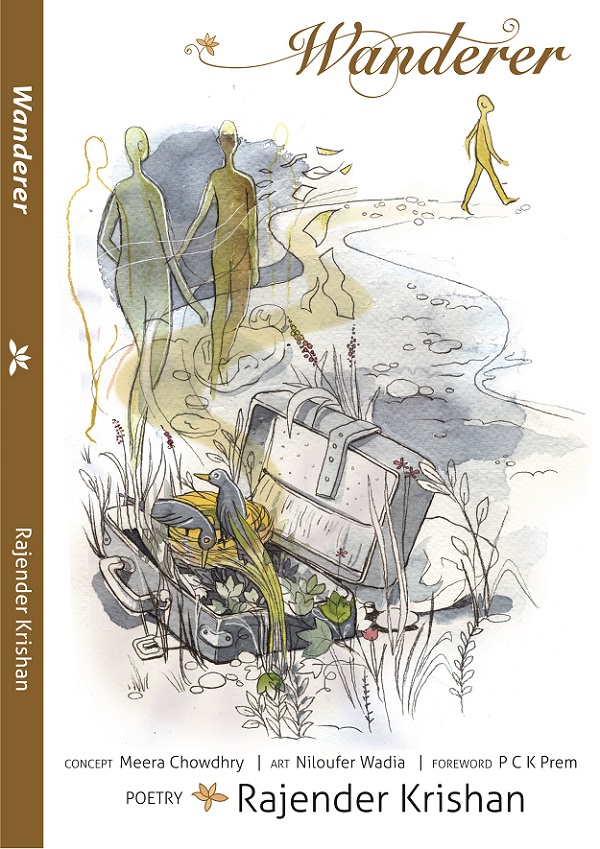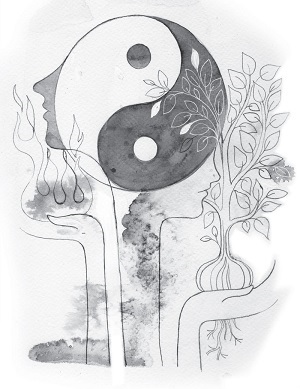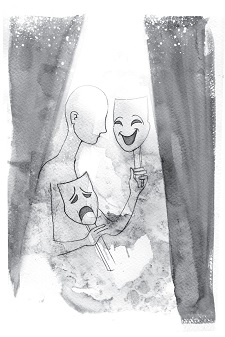Jan 07, 2026
Jan 07, 2026
Wanderer by Rajender Krishan
Paperback ISBN : 978-1-947403-15-4 Amazon ebook ASIN : B08T7VS8DZ
Available on Amazon USA | Amazon India
Pearls of Wisdom sprinkled through the pages of the remarkable Book ‘Wanderer’
“Poetry lifts the veil from the hidden beauty of the world, and makes familiar objects be as if they were not familiar.” – P.B. Shelley
 A poet is an observer, a thinker, a philosopher and an interpreter. A poet not merely expresses his own ideas, but the ideas of the prevalent society, the ideals that occupy the foremost place, the philosophy of life that influences the hearts of the millions of readers and the life experiences of not only his own life but those of others as well. The poet’s views are timeless and eternal which continue to influence generations and generations to come, unveiling the truth and essence of life.
A poet is an observer, a thinker, a philosopher and an interpreter. A poet not merely expresses his own ideas, but the ideas of the prevalent society, the ideals that occupy the foremost place, the philosophy of life that influences the hearts of the millions of readers and the life experiences of not only his own life but those of others as well. The poet’s views are timeless and eternal which continue to influence generations and generations to come, unveiling the truth and essence of life.
Rajender Krishan is one such poet whose thoughts, ideas and philosophies shall be imbibed by the readers for ages and ages. His poetry not only focuses on the present scenario of the ever changing, drastically transforming world but his poems reflect the possibility of the influence of the ideals of truth and contentment in conquering the ego, overcoming pride and establishing inner peace and harmony in a tranquil environment.
The poems in Rajender Krishan’s book ‘Wanderer’ are perhaps the most beautiful poems I have ever read.
The eternal truth and the mystifying presence of the Manifested Force create the surrounding aura in the mortal world and in this beautiful world, where the human being is often misled by distractions, the guiding light helps the misled soul to finally achieve the destination.
Commencing the journey with the marvelous poem ‘Inexpressible’, Rajender Krishan takes the readers along as they delve deeper and deeper into the meaning and purpose of life.
‘That what is inexpressible
is best to remain nestled
like the eternal witness’ (Inexpressible)
The love and comfort that the parents provide is immeasurable and inexpressible. The world seems to be the happiest place with the blessings of the parents who, despite all odds and all impediments, leave no stone unturned in creating and providing the best for the child. There is no better wealth or riches as compared to the love, compassion and blessings of the parents.
In ‘Remembrance’, Rajender Krishan, with his love-filled heart, pours out his emotions as a humble tribute to the parents who reside in the depth of a child’s heart, illuminating all aspects of his life and guiding him all through.
‘But how does one even
reminiscence about
the parent, who has
long been gone
and yet is a part
of one’s very own being?’ (Remembrance)
Sri Aurobindo says, ‘There is nothing that the mind can do that cannot be better done in the mind’s immobility and thought-free stillness. When mind is still, then truth gets her chance to be heard in the purity of the silence.’
 Mind, the sole controller of human actions, is not confined to the substance of the body but is free to explore other worlds of being and consciousness. To apply this mind-potential to the increasing problems of life which modern man has made for himself and to the problems which thinking-mind has created, the need is to recognize and become aware of the understanding of life experiences.
Mind, the sole controller of human actions, is not confined to the substance of the body but is free to explore other worlds of being and consciousness. To apply this mind-potential to the increasing problems of life which modern man has made for himself and to the problems which thinking-mind has created, the need is to recognize and become aware of the understanding of life experiences.
‘Man has reached almost the limits of his potential of mental mind,’ opines Norman C. Dowsett, ‘it is therefore imperative that he meditates on the next stage of his evolution if he is to solve the very problems his questing mind has produced and his physical and vital mind has desired and created.’
In the poem ‘Mind’, the poet enlightens the readers with the various facets of the human mind that are inaccessible and beyond the grasp of the human realms.
‘Is it plausible that the chaos caused,
due to the combination of elements,
the gunas, nature and the principles
of Life at large, is what manifests
camouflaged as the mind?’ (Mind)
One may have all the mental knowledge in the world and yet be immature to face the vital difficulties in life. The original action of the mind accepts the evidence of the senses, the impulses and only tries to give them some direction and possible success. The experience of the mind is the controller of all actions, reactions and judgments. Mind is the dubious outer layer of conscious existence and, as the scriptures say, it needs to be tamed and conquered.
Human conscience finds an apt mention in the poem ‘Conscience’ which helps the readers to get a peep into the depth of the apparent Self, solving many problems of logical and ethical responses one would appropriately choose in times of need.
‘The scriptures have since eons
preached to conquer the mind,
to crush the reservation on how’ (Conscience)
‘All the world’s a stage,’ says Shakespeare, and the philosophy of life, being an enacted play, holds true with appropriate roles being attributed to the players who, in the drama of life, experience, act, think, react, judge, decide, understand and reflect.
 According to the philosophy of The Bhagavad Gita, there is only one Doer (Karta) of all the actions that take place in this illusory world and all the members of this world are merely actors whose reins are held by the Master Himself. During this life, the attachments are ample, and the human mind increasingly gets trapped into the labyrinth of life, which becomes the reason for discontent and disharmony of the self.
According to the philosophy of The Bhagavad Gita, there is only one Doer (Karta) of all the actions that take place in this illusory world and all the members of this world are merely actors whose reins are held by the Master Himself. During this life, the attachments are ample, and the human mind increasingly gets trapped into the labyrinth of life, which becomes the reason for discontent and disharmony of the self.
The poet warns about such illusions in the poem ‘Flawless’ and presents a clear picture of the carefree untainted conscience untouched by the entangling complexities and the miseries of life.
‘Get not attached
to the character
when curtain draws
erase the actor’ (Flawless)
The ego has never been easy to get rid of. Despite all the knowledge related to the ill effects and consequences of the ego on the higher planes of consciousness and the impediments it imposes in the spiritual and personal progress of the self, the human being hardly wishes to let it go. Without persistent rejection one cannot be liberated from the clutches of the ego. It is only when the limits of the ordinary self are broken, that the mind enters a wider and enlarged consciousness and the possibilities of getting rid of the ego take birth.
The poem ‘Debate’ presents the finest example of the continual tussle between ‘Ego’ and ‘Morality’ that every human being on this Earth faces and often ‘Morality’ finds an exit door whereas ‘Ego’ reigns.
‘That’s when the sensible discussion
transformed into a competition,
inviting Ego and tossing Morality
out of the window.’ (Debate)
‘Practice what you preach’ is the philosophy of life that Rajender Krishan propagates in ‘Sly’ and several other poems which bring to light the fake ideals followed and promoted in the name of religion and God, which instead of uniting the humankind, create hiatus between hearts, never to be bridged. The poet expresses concern that the humanity seems to have lost track and all the goodness, compassion and empathy have given way to hatred and strife which seem to rule the hearts of the people in all corners of the world.
‘Ready to kill and destroy
in the name of the unknown,
Unwilling to bend even a bit
to render help to downtrodden’ (Sly)
‘Wanderer’ is the most beautiful gift to the humankind. These poems shall be treasured as the pearls of wisdom sprinkled through the pages of the remarkable book that Rajender Krishan has presented for the betterment and upliftment of human ideals and humanity as a whole.
More on Wanderer
13-Mar-2021
More by : Dr. Giti Tyagi